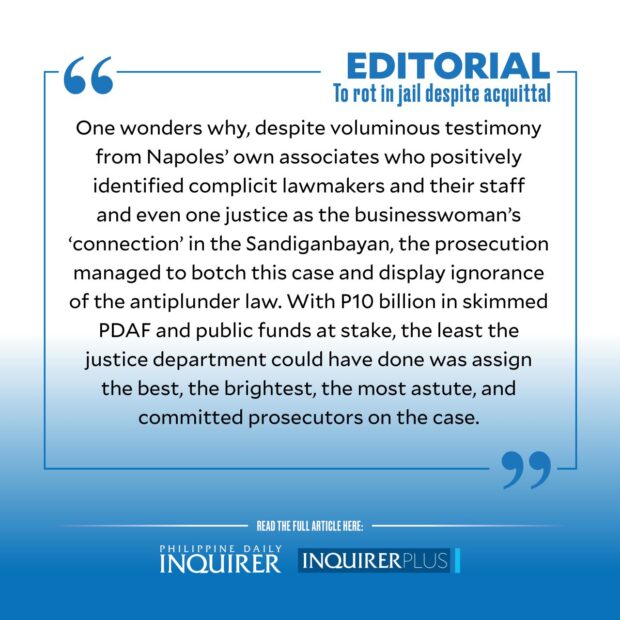To rot in jail despite acquittal
The Sandiganbayan’s acquittal of Janet Lim Napoles in 16 counts of graft over the use of Sen. Ramon Revilla’s pork barrel is not what we expected to hear — not after years of seeing evidence piling up and burying the woman deeper in allegations of diverting billions in several lawmakers’ discretionary fund into her account through bogus nongovernment organizations (NGOs) that she had set up.
fA separate division of the antigraft court, however, found the businesswoman and several others guilty on two counts of graft and two counts of malversation for the misuse of the fund allocation of former Davao del Sur congressman Douglas Cagas, who has since died.
That Napoles was previously convicted in two similar scams in 2018 and is currently serving time in prison, including a reclusion perpetua for plunder, also stoked our hopes that Martin Luther King Jr. would be proven right about “the arc of the moral universe [being] long but bend[ing] toward justice.”
Alas, the Sandiganbayan on Monday ruled that state prosecutors had failed to prove Napoles’ guilt beyond reasonable doubt in the Revilla case. Revilla was accused of funneling P224 million from his Priority Development Assistance Fund (PDAF or pork barrel) into Napoles’ nonexistent NGOs in exchange for kickbacks. Also named in the same scheme by whistleblower Benhur Luy, Napoles’ cousin and bagman, were former senator Juan Ponce Enrile and Sen. Jinggoy Estrada who, along with Revilla, were indicted for plunder and multiple counts of graft after several investigations prompted by a 2013 exposé of the PDAF scam by this paper.
The Sandiganbayan acquitted Revilla of plunder in 2021 but ordered him to return P124.5 million to the national treasury, a demand that his camp continues to contest.
In clearing Napoles, the Sandiganbayan’s First Division argued that the graft charges were the same predicate acts of plunder which Napoles and Revilla’s chief of staff, Richard Cambe, had been convicted of in 2018. Cambe has since died in government custody.
The term “predicate acts” refers to crimes that are a component or part of a larger crime.
“In other words, the prosecution can incorporate all the predicate acts in one charge of plunder instead of preparing a multitude of information and proving all of them in court,” the ruling noted. “Since the predicate acts were already used as basis [for] the crime of plunder, then the accused could no longer be charged separately for violation of the antigraft law,” it added.
Basically, the court said, the accused were charged twice for the same acts that were part of the bigger charge of plunder. Not only were the two sets of cases the same, the prosecution also presented the same testimonial and documentary evidence in the trial of both cases, read the decision written by Associate Justice Geraldine Faith A. Econg.
One wonders why, despite voluminous testimony from Napoles’ own associates who positively identified complicit lawmakers and their staff and even one justice as the businesswoman’s “connection” in the Sandiganbayan, the prosecution managed to botch this case and display ignorance of the antiplunder law. With P10 billion in skimmed PDAF and public funds at stake, the least the justice department could have done was assign the best, the brightest, the most astute, and committed prosecutors on the case.
Given that the scheme was exposed some 10 years back, and with all the information at hand, the prosecutors could have built a solid case instead of merely rehashing previous evidence. They could have started with the questions that people raised when Revilla was acquitted by the same antigraft body in 2021, but was ordered to pay back millions allegedly pilfered from his pork barrel. The Sandiganbayan division in its latest ruling again upheld that Revilla’s endorsement of Napoles’ NGOs was merely recommendatory and that he was “performing acts that were customary at the time.” Why the inconsistency in the ruling? Couldn’t the prosecutors have followed the money trail to trace where the P124.5 million came from, and where it ended up?
With only the deceased Cagas and Cambe hit with the full force of the law, one wonders if the half-hearted efforts of the prosecution helped provide a soft landing for the more powerful and moneyed individuals in the case.
There is, of course, some comfort in knowing that Napoles still faces a slew of cases before the Sandiganbayan, including those related to the discretionary funds of Enrile. The latest Sandigan ruling also sentenced her and several others to serve six to 10 years in prison for each of the two graft cases, and 12 to 17 years for each of the two malversation charges. In total, Napoles and her cohorts face 36 to 54 years in prison, and were asked to return P7.68 million for each conviction, or a total of P30.72 million for each person for the four cases.
Still and all, Sen. Risa Hontiveros spoke for most of us when she pointed out that Napoles’ acquittal is “a sad day for public accountability and our anti-graft efforts.”
















